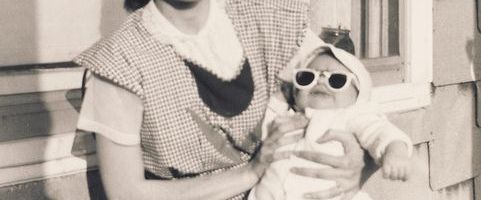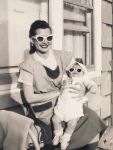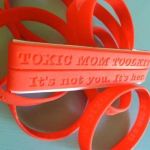 I was a baby left in a garbage can. It happens every day, you know.
I was a baby left in a garbage can. It happens every day, you know.
When I was a little girl, my brother told me that story as we lay under a rusty pick up truck at my dad’s lot. We used to go to the lot every weekend while my dad poured the foundations of his dream house by hand. In the summer, it was scorching hot on the half-acre cleared of shade trees. We were so little that we could lay under the running board with our chins resting on our stacked fists.
“They found you, you know, in a garbage can. And they asked me if we could keep you and I said yes, even though you were dirty,” he calmly told me.
I must have been four and my brother around nine. I remember my heart sinking, and then roaring back up to my throat. I scrambled up out from under the truck and ran to my busy father, elbow deep in quick dry cement.
“Was I borned in a garbage can?” I demanded to know as tears fell and my nose began to run.
My poor father. Can you imagine?
Like Bill Cosby navigating fatherhood he asked the dumbest question possible.
“Who told you that?”
In short order he assembled my brother and I side by side and went over the story my brother had hatched. Keep in mind, my brother was in the car with my parents when they drove to Social Services to pick up their adoptive baby – me. Because they had promised my brother a dog, they made a big deal about asking if getting a baby instead of a dog – just for now – was okay with him. They convinced him it was his decision. My brother knew I was adopted. He saw my parents sign the paperwork.
“Why would you tell your sister something so mean?” My father yelled. “You dumbbell, don’t you know you’re adopted too? Maybe you’re the one who was in a garbage can?”
That’s when my brother started bawling at the shock. Apparently he had never given a moment’s thought to his own origins. Our high-pitched wails and sniffles intermingled as we wiped our faces on our shirt hems. It must have been a long day for a dad in charge of two kids under ten.
Even though my dad nixed the garbage can story it stuck with me.
There have been years when it was part of my narrative. After I found my birth mother I realized it wasn’t factually true, but morally true. My birth mother literally cast me off and if she hadn’t had other options I could have very well been one of those babies left on a bus.
 The thing about family narratives, the stories we hear, the stories we repeat, the stories we whisper, is that they can tie us up, control us, lower our standards or goals and keep us from exploring the world around us. As daughters of Toxic Moms at some point we need to use our adult brains and look back at stories we’ve accepted at face value our entire lives.
The thing about family narratives, the stories we hear, the stories we repeat, the stories we whisper, is that they can tie us up, control us, lower our standards or goals and keep us from exploring the world around us. As daughters of Toxic Moms at some point we need to use our adult brains and look back at stories we’ve accepted at face value our entire lives.
We have to ask ourselves:
Is this true?
If it wasn’t true, why would someone say it?
Why was this particular thing promoted?
In the questionnaires I receive from Toxic Mom Toolkit visitors, there are usually stories about being told we aren’t smart, or pretty, or capable. We won’t amount to anything. Nobody will ever love us. Our only job is to prop up or take care of our toxic moms.
When we don’t go back and review the things we were told about ourselves as children with our adult brains we are risking accepting false information that can limit our whole lives.
A challenging exercise is to make lists of what your mother, father, grandparents, siblings, aunts/uncles, cousins and close family friends told us about our skills, talents and potential. Cross out the things that are not true or that you don’t want to be true. Then go out there and prove them wrong.
These stories are not life sentences. You can rewrite your narrative.
I have a dear friend who was told by his mother from the time he was a little boy that he was lousy at sports. So lousy, that he risked hurting himself or others if he even attempted any sort of organized sport. If he pushed to participate in things like a class ski trip, he got less than no support. He was the kid in wet jeans with chattering teeth because his mother wouldn’t buy him equipment “for just one trip.”
His father also told him that he couldn’t do anything that required using mechanics tools.
Turns out as an adult he realized that his mother’s storyline about his inability to even catch a ball started around the time that the child asked if he could join Little League. He remembers one practice where all the other kids parents came to cheer their children on. At the end of the game, families drove off together for pizza. He was the last kid there waiting for hours until his mother finally arrived. The truth of the matter was that she didn’t want to be on the hook for ball games and snacks and schedules and driving and dropping off and picking up. And so my friend was told he was bad at sports. To this day she still claims he didn’t want to play sports.
Why was he bad at anything requiring tools? I think it’s because his dad was a luxury car mechanic and wanted to be the only one capable of repairing cars. He wasn’t willing to teach, so he ridiculed.
Luckily for my friend, as an adult he started trying things he thought he might enjoy. At his gym he’s a great racquetball player and enjoys being part of a league. He loved Bruce Lee and started studying martial arts. He’s so accomplished now that he teaches kids on Saturday mornings. His students love him.
What do his parents think of all his successes at work, sports, with friends and clubs, and his endless creativity? They’re sort of amazed. They didn’t know he had it in him.
But he does. And that’s what matters.
Tags: bad moms, child neglect, daughters of Toxic Moms, difficult mothers, facing family secrets, hurtful family stories, mean moms, Rayne Wolfe, rewrite your family narrative, rewrite your family story, Toxic Mom Toolkit, Toxic Mom Toolkit on Facebook, Toxic Mom Toolkit on YouTube, toxic parenting
 Have you ever thought, “I need therapy.”
Have you ever thought, “I need therapy.”













